How to be truly inclusive: an anti-ageist tone of voice guide
Feel free to download this inclusive language guide:
Anti-ageist tone of voice manual
This guide was written as a practical addition to our blog on anti-ageist copywriting.
Because so many sources on anti-ageism in marketing communications are focused on imagery, we at Writitude felt a need for creating a text-oriented manual.
Here you’ll find examples of phrases to be avoided in communication if you don’t want to sound ageist, along with suggestions on how to make your copy more inclusive.
These recommendations apply to three types of content:
• Content exclusively aimed at older customers (e.g., beauty products and medical services developed specifically for customers over 60)
• Content indirectly aimed at older customers
Actually, most products aimed at older customers are also viewed by people who may want to buy this product for an older person in their life — for example, a millennial may be interested in buying a tastefully packaged intense-action serum for their parent.
However, copy for some medical services and products, as well as de- vices or services for assisted living is often specifically aimed at those who act as caretakers for older people.
• Pretty much any type of content
Just because a product or service is meant for a younger audience doesn’t mean that anti-ageist recommendations don’t apply.
Firstly, everyone benefits from inclusivity. An environment where one cohort is treated positively while other groups or individuals are regarded as inferior is by definition less friendly than an environment where everyone feels welcome.
Secondly, chances are that some of your younger customers may be sensitive to ageism for personal reasons related to older relatives, friends or mentors. Or maybe, they just know that they, too, will age.
Our bottom line is, ageism is never OK, and we’re here to help you avoid it in your communications. If you’d like to add something to our guide, feel free to save it in your notes for later editing.
Writitude is trained to spot inappropriate phrases and clichés, and you can add your own examples depending on your needs and preferences.
Decide whether age is really relevant
Obviously, there are products and services that will be of more use to older customers — there’s no way round the fact that our bodies change in the course of our lives, so do many of our physical needs.
Still, our lifestyles vary greatly no matter what age we are. Many 25-year-olds are into houseplants and cottagecore, many over-60s resent gardening and enjoy checking out new hotspots around town.
This doesn’t mean there’s anything wrong with a vice versa setup.
And although we’re not arguing with the reality of targeting, we highly recommend taking individuality into account. Don’t think of your audience as a homogenous hivemind — think of them as a large group of individuals.
There are indeed very few age-specific products. Electronic devices, cosmetics, comfortable shoes, eyewear or shampoo for grey hair are used by people of all ages.
This is why we recommend you try to avoid focusing on age specifics when possible. It’s better to say that a certain brand “has eyewear for every lifestyle” than to say that “no matter how old you are, we have the perfect glasses for you”.

Where age is relevant, be respectful
There are some terms that over-60s prefer to be called and others they dislike, yet they can sound pretty much the same to the unemphatic ear. “Elderly” is considered patronizing, while “elder” is perceived as respectful. “Senior citizens” sounds bureaucratic, while “seniors” is deemed neutral.
We at Writitude personally prefer the phrase “over-60s” because it refers to everyone in the same age group, without judgement or bias.
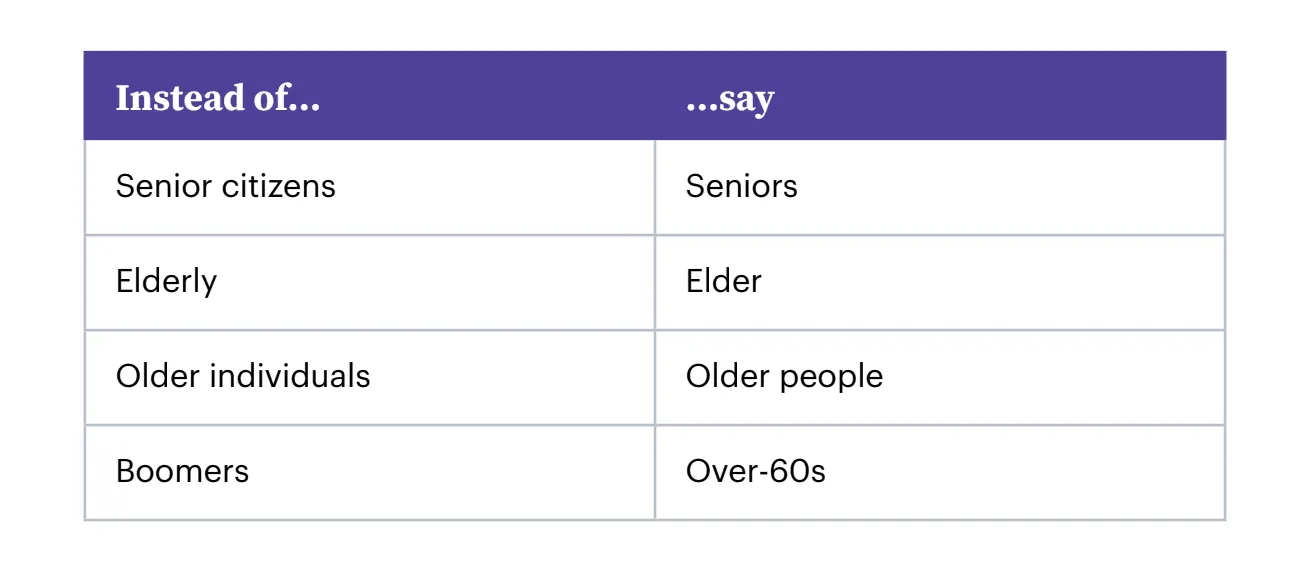
Be specific
If it is necessary to mention the customers’ age, we recommend being specific. By mentioning concrete numbers, you’ll save your consumers time because they’ll immediately know that the product is meant for them.
You’ll also demonstrate a transparent approach that will add to your market trustworthiness.

Focusing on the concrete benefits of your product instead of vague epithets like “anti-age” or “rejuvenating” will also earn you some bonus transparency points.
Saying that your new serum will target fine lines and dehydration is much more informative and truthful than stating that it will “fight ageing”.
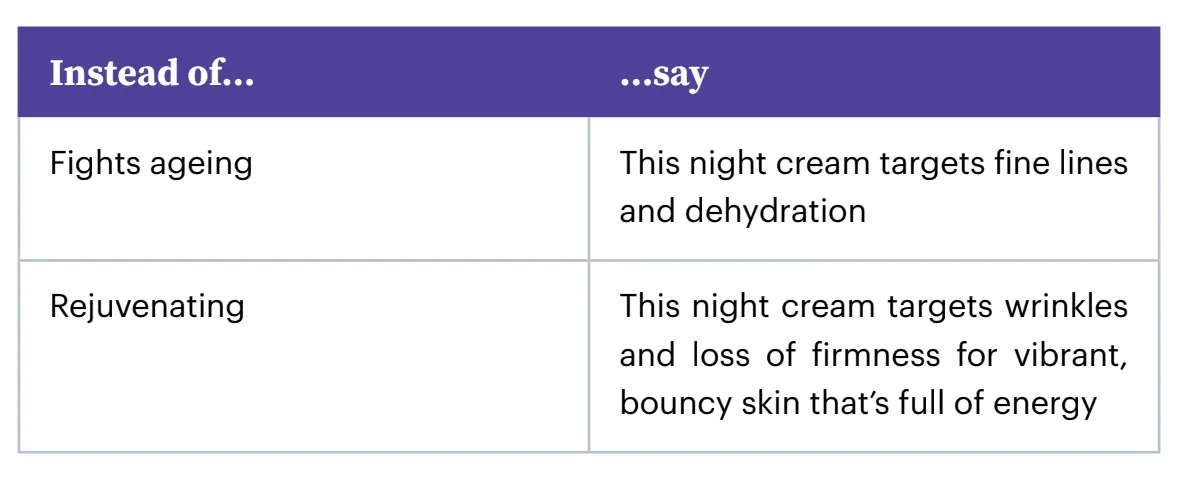
Don’t attribute negative meaning to age
There’s no logic in implying that ageing is something bad and is to be avoided at any cost. Ageing is a natural part of life and by stigmatizing it, we’re only making it scarier.
This is why we recommend excluding words like “anti-age” from your copy, substituting them with specific claims that highlight your benefits.

For the same reason, we recommend avoiding any implication that the best thing that can happen to an older person is to feel young.
A human with a rich life experience is able to identify so many different feel ings and sensations. Why limit them to a one-dimensional juxtaposition of youth and old age?


Don’t exclude older people from communications
The more you stigmatize someone, the harder it is for them to fit in the community, the further apart you grow from each other.
This is why we discourage implying that certain things are by default meant for younger people. Intergenerational communication is enriching for both sides — so why limit your own growth?
The problem is, some words or phrases may signal exclusion indirectly — there’s nothing bad about them per se, but they’ve become designators for the younger generation.
While you may not intend to exclude older people by using them, they may feel they’re not welcome as your customers or employees.

Don’t try to be funny at the expense of older people
When a senior jokes about their age, it’s authentic humour. When a younger person jokes about something attributed to ageing, it’s usually mean and not really funny.
We love and welcome humour. But copywriting is not just about amusement. Your main goal is to establish a positive connection with your customers — not to challenge, hurt and alienate them.

Please, no boomers!
Once a neutral term describing people born from 1946 to 1964, in recent years the word “boomer” has clearly become derogatory.
We can only hope that those who come after us will be more emphatic to the generational cohorts of Generation X and millennials … Oh… who are we kidding?
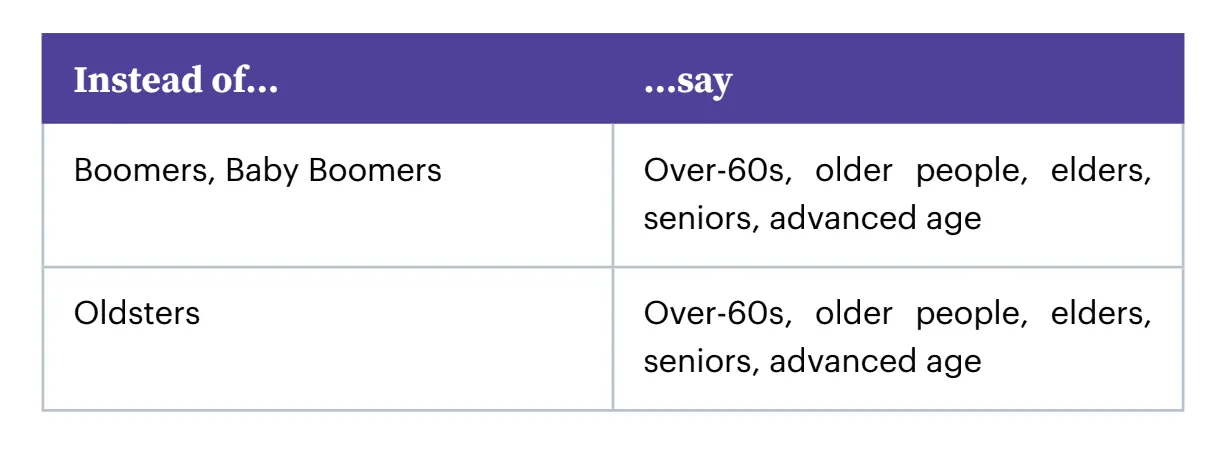
Respectful doesn’t mean cold
Sometimes, when a brand wants to sound respectful, they opt for a language that is official and therefore feels cold. In fact, there are many ways to show respect for your elders.
One of them is avoiding cold bureaucratic language that makes a person feel more like a statistical unit than a human being.
Getting rid of the bureaucratese results in a warmer, more welcoming Tone of Voice for your brand — a good thing in itself, irrespective of the age of your target audience.


Activities have no age limit
We highly recommend against using clickbait phrases like, “Look what this grandma can do at 75!”, “85 and still looking handsome as ever!”
People do different things at different ages, and most of us prefer to be admired for what we do and how we do it, not the age we do it at.
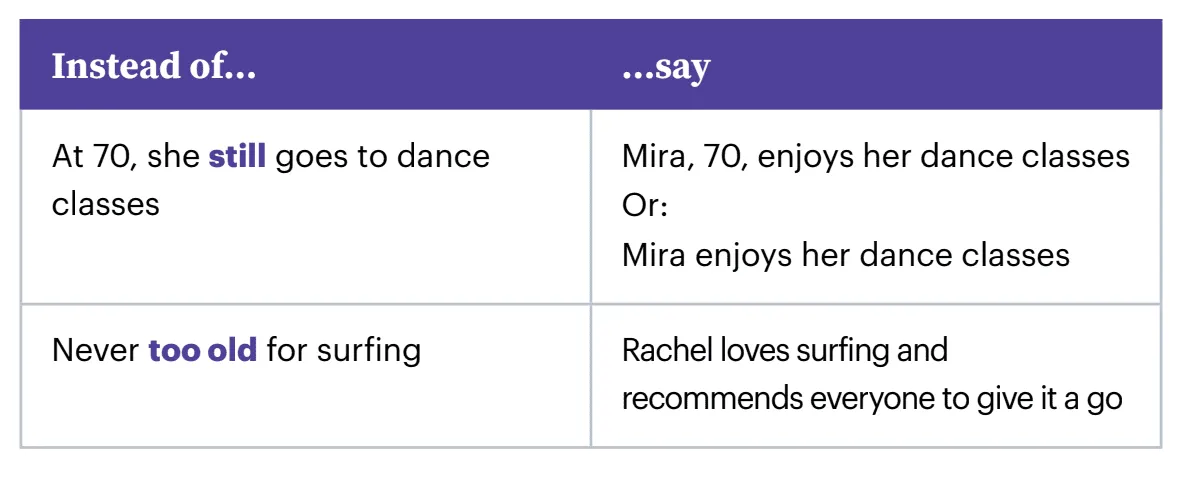
Denying age isn’t anti-ageist
Every stage in our lives has its challenges. What for some people is the time of joyous self-rediscovery, can be for others a difficult period of re-adjustment. Often it’s both.
There’s no way around the fact that our bodies change with time, although these changes can be quite disparate and come at a different pace.
Ageing is natural, and the if-I-pretend-not-to-see-it-maybe-it-will-go-away strategy isn’t very effective. It may sound like an inclusive choice, but in reality it just makes people feel invisible.
This is why we recommend avoiding clichés like “age is just a number” or calling the latter decades of one’s life the “golden years”.
Of course, this may be true for many people, but no two life stories are the same.
Happiness and misfortune, connection and loss occur at different points of one’s life.
However, it’s exactly for this reason why bigger terms like “ageless” can be used when you want to explore the philosophical aspects of time and age.
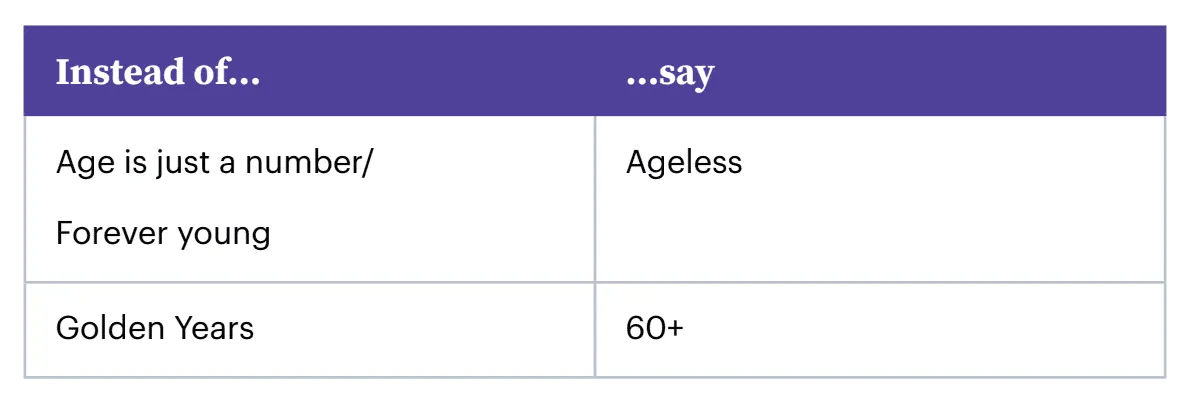
For some inspiration, we highly recommend watching these advertisements by Tena.
Here, age is neither glamorized nor demonized. We see both the challenges and the opportunities that it presents.
What’s also important, we see that everyone has their own story and we cannot but wonder how our own lives will be several decades from now. By all means, we hope that by then, ageist language will be a thing of the past!


